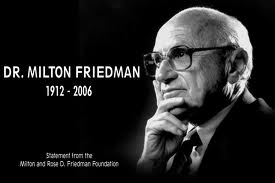Why Conservatives Should Reread Milton Friedman
< < Go Back
 It’s easy to think that our continuing impasses over the federal budget stem from deep differences in principle between conservatives and progressives over the role of capitalist enterprises in our society. Progressives favor substantial constraints, through taxation and other sorts of regulation, whereas conservatives think that, as Milton Friedman put it in his classic “Capitalism and Freedom,” “there is one and only one social responsibility of business — to use its resources and engage in activities designed to increase its profits.” But if we look more deeply into Friedman’s view, the difference between his conservative economics and progressive views shrinks considerably.
It’s easy to think that our continuing impasses over the federal budget stem from deep differences in principle between conservatives and progressives over the role of capitalist enterprises in our society. Progressives favor substantial constraints, through taxation and other sorts of regulation, whereas conservatives think that, as Milton Friedman put it in his classic “Capitalism and Freedom,” “there is one and only one social responsibility of business — to use its resources and engage in activities designed to increase its profits.” But if we look more deeply into Friedman’s view, the difference between his conservative economics and progressive views shrinks considerably.
To see why, we can start with the conclusion of the passage (omitted when I quoted it above) where Friedman says that the only social responsibility of business is “to increase its profits.” The full text reads: “there is one and only one social responsibility of business — to use its resources and engage in activities designed to increase its profits so long as it stays within the rules of the game, which is to say, engages in open and free competition without deception or fraud.”
This qualification acknowledges a key restriction on the maximization of profit. More important, it commits Friedman to the principle that there can be restraints on the capitalist system that are not self-imposed but rather imposed by the society that employs this system for its own purposes.This principle is also implicit in Friedman’s claim that if a business used any of its profits for social goods, it would be usurping the role of the political system.
It follows that, on Friedman’s own account, capitalism is not an economic system that operates independently of the political system in which it is embedded. It is a creature of that system, which has goals (of morality and social responsibility, for example) that go beyond the profitable exchange of goods. Therefore, the owners of businesses must accept governmental restrictions on their profit-making for the sake of overriding social values.
It might seem that this activist role for government flies in the face of Friedman’s libertarian insistence on the magic of Adam Smith’s “invisible hand” to produce “public goods from private vices,” without political control. In fact, however, Friedman makes it clear that the invisible hand is attached to the body politic.
More From The New York Times:



